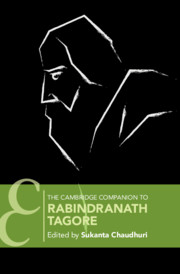Book contents
- Frontmatter
- Contents
- List of Illustrations
- Notes on Contributors
- Preface
- Note on Conventions and Practices
- 1 Rabindranath Tagore: From Art to Life
- 2 A Garland of Many Tagores
- Part I Overviews
- Part II Studies
- 12 Women, Gender, and the Family in Tagore
- 13 On the Seashore of Endless Worlds: Rabindranath and the Child
- 14 Tagore's View of History
- 15 Tagore's View of Politics and the Contemporary World
- 16 Tagore's Santiniketan: Learning Associated with Life
- 17 Tagore and Village Economy: A Vision of Wholeness
- 18 An Ecology of the Spirit: Rabindranath's Experience of Nature
- 19 Rabindranath and Science
- 20 Rabindranath Tagore as Literary Critic
- 21 Tagore's Aesthetics
- 22 Rabindranath, Bhakti, and the Bhakti Poets
- 23 Tagore and the Idea of Emancipation
- 24 Tagore's Thoughts on Religion
- 25 Rabindranath Tagore and Humanism
- List of Tagore's Works Cited, with Index
- Further Reading
- General Index
17 - Tagore and Village Economy: A Vision of Wholeness
from Part II - Studies
Published online by Cambridge University Press: 24 December 2019
- Frontmatter
- Contents
- List of Illustrations
- Notes on Contributors
- Preface
- Note on Conventions and Practices
- 1 Rabindranath Tagore: From Art to Life
- 2 A Garland of Many Tagores
- Part I Overviews
- Part II Studies
- 12 Women, Gender, and the Family in Tagore
- 13 On the Seashore of Endless Worlds: Rabindranath and the Child
- 14 Tagore's View of History
- 15 Tagore's View of Politics and the Contemporary World
- 16 Tagore's Santiniketan: Learning Associated with Life
- 17 Tagore and Village Economy: A Vision of Wholeness
- 18 An Ecology of the Spirit: Rabindranath's Experience of Nature
- 19 Rabindranath and Science
- 20 Rabindranath Tagore as Literary Critic
- 21 Tagore's Aesthetics
- 22 Rabindranath, Bhakti, and the Bhakti Poets
- 23 Tagore and the Idea of Emancipation
- 24 Tagore's Thoughts on Religion
- 25 Rabindranath Tagore and Humanism
- List of Tagore's Works Cited, with Index
- Further Reading
- General Index
Summary
Rabindranāth Tagore was born and brought up in a city: Calcutta, now Kolkata, the erstwhile second city of the British empire. He belonged to the third generation of a propertied family. His grandfather ‘Prince’ Dwārakānāth Tagore built up the family fortune in the modern sense of the term. Dwarakanath's eldest son, Debendran th, was Rabindranath's father. It is well known that Rabindranath never felt close to his grandfather in spirit. He felt greater affinity with his philosophic father: the two had a warm relationship over some forty years.
Young Rabi was brought up on disciplinarian but markedly unorthodox lines. The child's unusual nature made him resist institutional education. He was almost entirely taught at home in many fields – general education, science, music, painting – but in an unconventional way, neither ordered nor complete, nor even always rigorous. This recipe for disaster turned out wonderfully well in his case. It conditioned him to break conventions, as evident in all his creative work: poetry, music, painting, theatre, and even dance.
This chapter concerns his ideas on rural welfare and development in India. It may appear a strange concern for a literary personality of Rabindranath's stature; even more that he should pursue it with the zest of an activist. In fact, his engagement with such action-oriented projects was part of a grander design for a complete and harmonious life in society as a whole. This made village work as creative for Rabindranath as writing poetry and composing music. They all contributed to his project of wholeness.
THE ESSENCE OF SHRI
I have mentioned the related concepts of wholeness and harmony. Rabindranath's life's project took shape as a comprehensive endeavour towards those goals, absorbing almost anything that came his way – many strands of thought and practice, derived from both East and West. The spirituality of Upanishadic tradition, acquired from family sources, fed an aesthetic consciousness that was, at the same time, deeply rooted in sociopolitical reality. But his abiding concern all through was the notion of shri, which can be defined as grace, harmony, and well-being informed by a sense of inner truth. This commitment to truth made him look critically at the ritualistic aspects of not only religious practices but all spheres of social and political life. Instead of heeding the mystic call of an inner voice, he directed a rational, critical gaze at the reality around him.
- Type
- Chapter
- Information
- The Cambridge Companion to Rabindranath Tagore , pp. 309 - 322Publisher: Cambridge University PressPrint publication year: 2020



